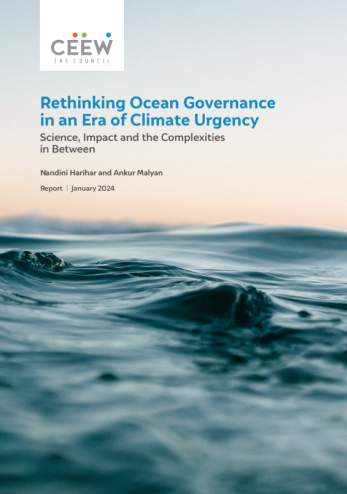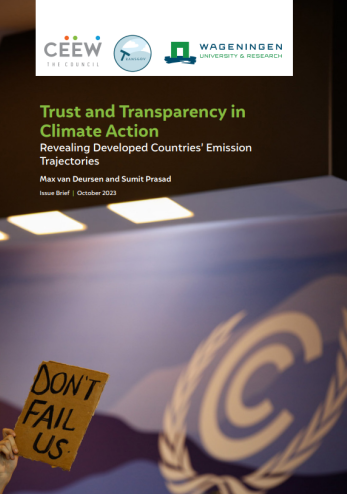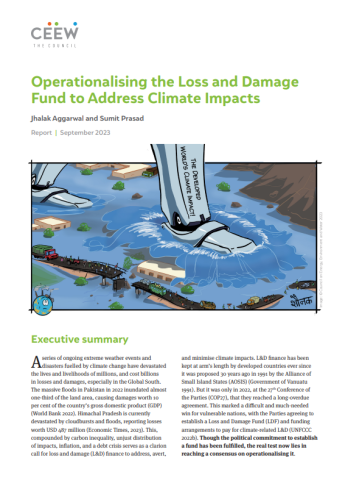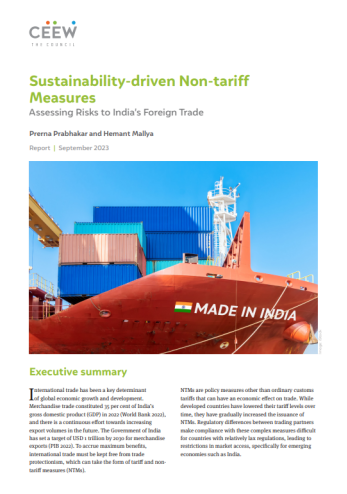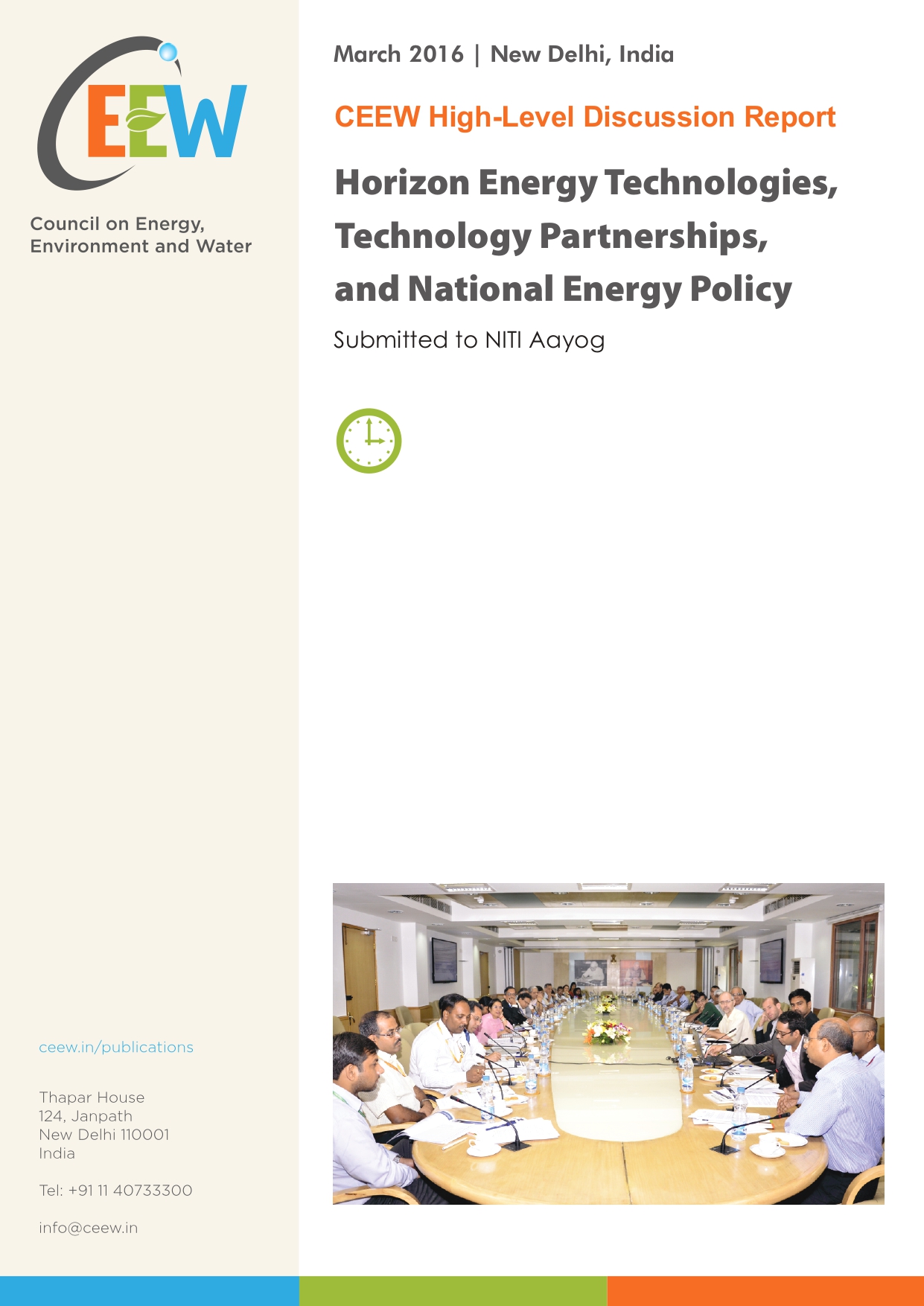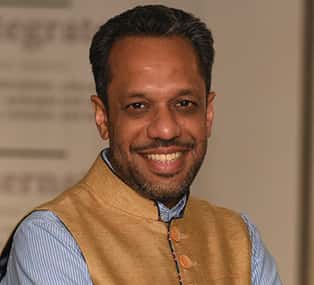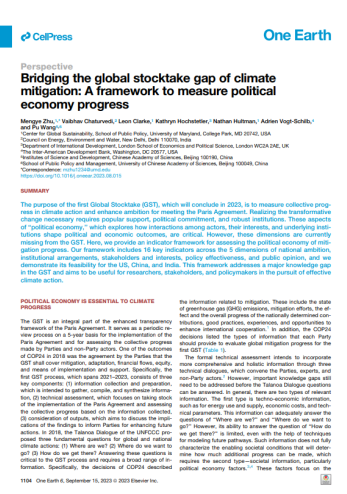Other Publications
Horizon Energy Technologies, Technology Partnerships, and National Energy Policy
March 2016 | International Cooperation
Suggested Citation: Council on Energy, Environment and Water. 2016. Horizon Energy Technologies, Technology Partnerships, and National Energy Policy. New Delhi: Council on Energy, Environment and Water.
Overview
This report is a summary of a high-level roundtable organised in collaboration with NITI Aayog to define the role of the National Energy Policy (NEP). It focuses on fostering horizon energy technologies that are not yet commercialised, viewing them strategically and pursuing them within ambit of India’s new NEP drafted by NITI Aayog. The discussion highlighted the need to address the key policy changes required to accelerate technology transfer and to foster technology partnerships. Participants included experts and key stakeholders, including senior experts from the government, academia, industry, and civil society.
Key Highlights
- Horizon energy technologies are the technologies that are a long way from being commercialised. Hence, the role of policies in discovering and supporting both horizon technologies as well as beyond-horizon technologies is critical.
- An important role of policy is to provide a long-term signal and direction to private investors and market leaders so that they can start investing in projects headed towards the direction indicated.
- India can become a global leader in the commercialisation, research, and deployment of horizon technologies and can also lead in setting up a global manufacturing base.
- The policy should be customised in the Indian context and avoid incentivising a particular technology.
- India has a low-cost procurement environment which should help in the commercialisation of future energy technologies, giving the country a cost advantage.
- The NEP should enable the Ministry of Finance and the Department of Science and Technology to undertake technology transfer smoothly and expeditiously.
- It is important to identify areas and sectors that require horizon energy technologies and to prepare a suitable framework to deal with future challenges.
- It is important to benchmark technologies in order to compete effectively with the development of cutting-edge technologies in different countries. Also, the role of the government and the bureaucracy in the benchmarking process is important.
- Horizon energy technologies and technology partnerships need to be part of India’s NEP.
- It is important to work across the energy sub-sectors, spanning both supply side as well as demand side, and to develop a micro-level understanding of each sub-sector so as to initiate collaboration across these for the development of horizon energy technologies.
- It is critical to involve the state governments in ultimately meeting the country’s energy-related aspirations and in building the infrastructure required for R&D.
- Funding should be channelised for transforming horizon energy technologies being developed in the laboratory into applicable and marketable forms through technology partnerships.
- Effective technology partnerships could help in bridging the gap between the need for increased investment in energy technologies and the current scenario of low investment in R&D in energy technologies.
Key Recommendations
Set up an a dedicated expert committee on horizon energies technologies and technologies partnerships (EC-HETTP) that will:
- Collate and synthesise the existing research findings on horizon energy technologies and technology partnerships both in India and abroad.
- Develop criteria for the identification of horizon energy technologies with a cross-sectoral view, including on-grid technologies, off-grid technologies, and other supply and demand-side technologies.
- Develop criteria for establishing effective technology partnerships.
- Identify and prioritise a list of horizon energy technologies that are of strategic importance to India based on the identified criteria.
- Review the role, performance, and achievements of the Council of Scientific and Industrial Research (CSIR) in fostering energy technology development and highlight learning and best practices emerging from the efforts of CSIR.
- Propose policies and programmes through which India can move on the path towards the development and commercialisation of horizon energy technologies in an expeditious manner.
- Suggest a plan of action for providing enabling conditions like human resource capacity, finance, and networking for the fulfilment of the objectives of the policy on horizon energy technology development.
- Indicate the dedicated annual public funding required for the purpose.
The expert committee should play an essential role in harbouring and supporting horizon technologies, as an independent entity having board representation from relevant stakeholders from government, private sector, and academia.




